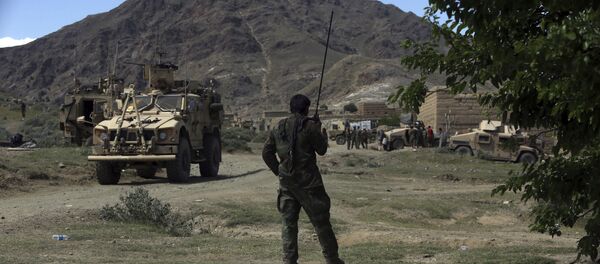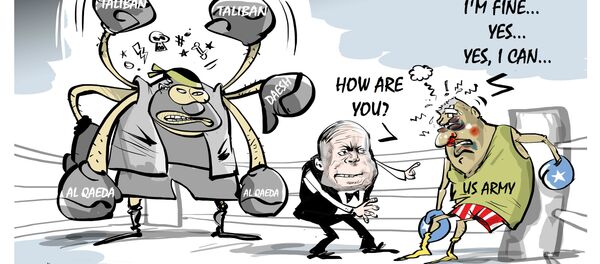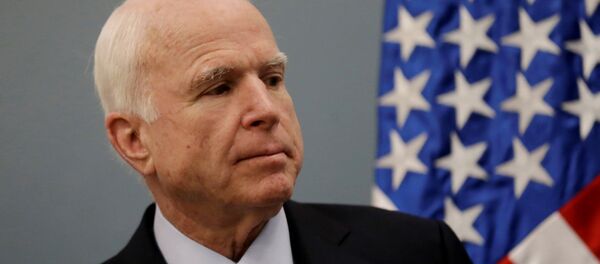Prince, the founder of Blackwater — the private military company which gained notoriety in Iraq following the US invasion in 2003, has returned to the American political arena after several years in the shadows. His return has been made possible in part by the fact that he has new, powerful allies in Washington, including Betsy DeVos, Prince's sister and the current US Secretary of Education, as well as Steve Bannon, Trump's chief strategist, and Vice President Mike Pence.
"But it's not just about connections and relatives," political commentator Ilya Plekhanov wrote, in an analysis on Prince's new proposals for RIA Novosti. "Prince has distanced himself from Blackwater's controversial past, and has again begun to aggressively and publically offer to solve global security problems with the help of private military contractors."
Prince's proposals are nothing new, the journalist noted. In 2006, the former Navy SEAL-turned businessman was discussing the possibility of creating mercenary-based 'peacekeeping' forces, meant "to replace the slow and indecisive UN forces, and quickly and efficiently establish order in hot spots around the world."

Nearly a decade later, in 2014, "Prince visited Nigeria and offered to destroy Boko Haram and stop the theft of oil in the country with the help of contractors for a sum of $1.5 billion. A year after that, Prince proposed creating a private coast guard service in Libya, which [he said] would stop the flow of refugees to Europe in four months-time."
Prince pitched the latter idea to Brussels and what remained of the Libyan government – the project to be funded by unfreezing Libyan bank accounts seized following Muammar Gaddafi's 2011 ouster and murder in a NATO-sponsored uprising. But the idea never did found support from the right people, and subsequently petered out.
"The founder of the world's best known private military company in the world also offered to crack down on Daesh in Iraq and Syria, and to do so in short order, without any excess geopolitical games," Plekhanov recalled. "In Prince's view, this would have been cheaper than all current operations in the fight against the Islamists. But with politicians ever mindful of the fact that much of the chaos in Iraq was created at the hands of Blackwater in the first place, the proposal predictably fell on deaf ears."
And then there is the case of Afghanistan. "Even if the US and coalition forces were to increase their presence in the country to 20-25,000 troops, there is little reason to believe that they would be able to do something better than the 140,000 that were deployed there in earlier years," the journalist noted.
"It's for this reason that Steve Bannon and [Trump advisor and son in law Jared] Kushner wanted to organize a meeting between Pentagon chief Gen. James Mattis, Eric Prince and billionaire Steve Feinberg, owner of DynCorp International, one of the most powerful military contractors in the world. Feinberg, incidentally, had already met with Trump previously to discuss Afghanistan policy and the work of intelligence agencies, and Erik Prince had consulted with White House officials and met with general H.R. McMaster, Trump's national security adviser."

An Afghan 'New East India Company'
Prince, in keeping with his grandiose customs, has proposed to create an Afghan version of the British East India Company, "establishing the semblance of a 'viceroy' who would be responsible for everything that happens in the country, as was done by the British in India in the 18th century. This viceroy, under Prince's plan, would resolve all issues in the country personally, without the bureaucratic delays and endless meetings with Washington, and would answer only to the US president," Plekhanov wrote.
Prince proposed as a model General Douglas MacArthur's position in post-war Japan. In the late 1940s, the Allied Commander was able to help substantially reduce corruption, and participated in the creation of a Japan's new post-war constitution.
Another 'innovation' in the businessman's plan, in Plekhanov's view, was that he proposed to send mercenaries to Afghanistan not on a rotating basis, but for many years at a time (if not their whole lives), to live and serve in military units alongside Afghans, learning the local language and culture. This, according to Prince, would help convince Afghans' of the West's 'good intentions'.

"The main investors in the project, according to Prince, should be the large Western corporations interested in extracting Afghanistan's natural resources, and dislodging the opium trade. DynCorp, previously contracted to provide logistical, repair, and construction operations, has already received $2.5 billion in contracts from the US State Department."
In other words, supporting Prince's plan would mean changing the entire US approach to Afghanistan, Plekhanov wrote. "Instead of focusing on controlling the population and large cities, the US would focus on controlling revenue sources, namely those from natural resources – the mines, pits, and quarries currently operated by the Taliban," instead of bringing a profit to the country and US companies.

It's easy to see why not everyone in the US is enthused about Prince's plan, the journalist noted. The press has called Prince's proposals on the creation of a new East India Company 'neo-colonialism.'
"Journalists and experts justifiably noted that under such an approach, private corporations operating in Afghanistan under the protection of mercenaries for the sake of profit and without regard for the country's long-term prospects would be receiving too much power," Plekhanov wrote.
Nevertheless, the journalist emphasized that "the very fact that such conversations with the private sector are taking place indicates that the US leadership is trying to find commercial solutions to the Afghan crisis, in addition to the military ones."
"One way or another, Mattis is expected to submit to Trump his further recommendations on Afghanistan this month. Former US special envoy to Afghanistan and Pakistan Laurel Miller, who left her post in June, has said that the status quo does not suit anyone, and it is important for Washington to consider all possible options to influence the situation. Even the most extravagant ones," Plekhanov concluded.







